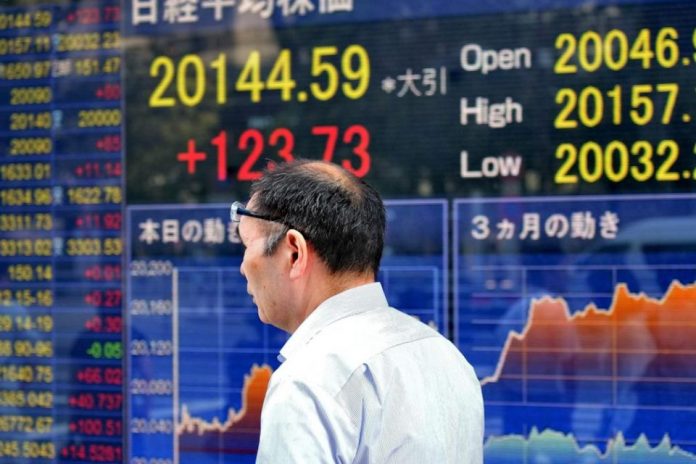Markets across the Asia-Pacific region were in the red on Monday with investors worried about the impact of the new coronavirus outbreak on the global economy.
The virus has killed more than 900 people, infected 40,000 across mainland China and spread to more than two dozen countries in what has been termed a global health emergency. It has also jolted major supply chains for everything from food and household supplies to car and electronics parts.
Hong Kong’s benchmark Hang Seng Index tanked 1.1 percent at the open but later pared some of the losses. Elsewhere in morning trade, Tokyo was down 0.2 percent, Sydney dropped 0.1 percent, and Singapore was down 0.3 percent.
Shanghai was 0.1 percent lower while Seoul, Taipei, Jakarta, and Manila were also under water. Investors around the world have been watching with concern as China, the world’s second-largest economy, battles the novel coronavirus, which emerged at the end of last year in the central city of Wuhan. The domestic impact was reflected in China’s inflation figures released Monday, which showed the highest rise in consumer prices in more than eight years with food prices spiking more than 20 percent.
It has also disrupted the supply chains of major global firms like Apple supplier Foxconn and auto giant Toyota. Key production facilities across China have been temporarily closed, with authorities imposing lockdowns and quarantine measures across the country.
The World Health Organisation has said that there are some signs that the epidemic is stabilising in China, but the agency’s chief has cautioned that the number of cases overseas could be just “the tip of the iceberg”.
“This coronavirus seems to be going on for longer, is infecting more people and the hit to growth will be longer,” Diana Mousina, an economist at AMP Capital Investors, told Bloomberg TV. “You won’t be able to recoup all of the negative impacts in the first quarter.”
Analysts have cautioned that the economic impact of the coronavirus outbreak in mainland China and beyond is yet to be fully understood.
“Let’s not try to sugar coat things here,” said Stephen Innes, chief market strategist at AxiCorp. “With a chunk of China’s industrial complex shuttered beyond (Lunar New Year), we’re headed for one of the worst Q1 economic growth periods on record.” The Asian drops at the start of the week came after a negative cue on Friday on Wall Street, where the three main indexes closed down.
Depressed economic activity in China, the world’s largest importer and consumer of oil, has also hit energy markets with crude prices tumbling. A committee appointed by OPEC recommended additional output cuts on Saturday, citing the negative impact of the epidemic on economic activity.
On Monday, West Texas Intermediate was down 0.2 percent, with Brent edging slightly into negative territory.




